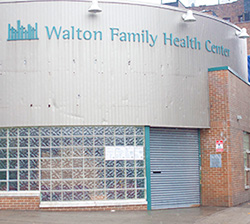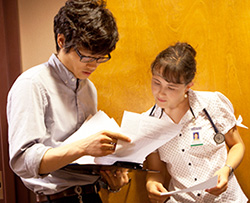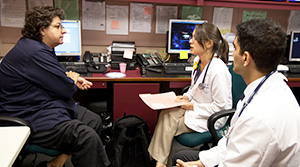

Fifteen Years of Community Healthcare
An Evening with ECHO: Celebrating 15 Years of Community Outreach
In 1999, a handful of Einstein students, concerned about uninsured New Yorkers' lack of access to healthcare, founded the Einstein Community Health Outreach (ECHO) Free Clinic to provide care to uninsured Bronx residents. Their efforts made Einstein the first medical school in the New York metropolitan area and one of the first in the nation to establish a student-run free clinic.

The ECHO Clinic is based at the Walton Family Health Center in the South BronxThe clinic started as a joint project of Einstein and the Institute for Family Health (the Institute), a partnership that continues to this day. Institute staff members operate the clinic, while Einstein students coordinate its services. Staff includes Einstein faculty members Drs. Amarilys Cortijo and Sarah Nosal, ECHO's founding medical director and assistant medical director respectively, who serve as faculty advisors. Dr. Cortijo is the medical director of the Institute's Mount Hope Family Practice, and Dr. Nosal leads the Institute's Urban Horizon's Family Health Center and serves as its Chief Medical Information Officer.
"Dr. Cortijo has been a wonderful mentor to me and to our students," said Dr. Nosal, who is a member of Einstein's class of 2004 and began volunteering at the ECHO clinic as a first-year medical student, in 2000. "We view access to healthcare as a social justice issue."
Filling an Important Need

Students assist with overseeing the clinic’s administrative tasks Based at the Institute's Walton Family Health Centerin the South Bronx, and open on Saturdays, the ECHO clinic offers free, high-quality, comprehensive primary care—including routine medical exams, social services, counseling and referrals—to uninsured individuals. Working alongside licensed physicians, more than 200 Einstein students provide 1,000 medical care, health education and social service visits each year.
While ECHO initially served only the Bronx community, today it draws patients from all of New York City's boroughs, as well as from lower Westchester and parts of New Jersey and Pennsylvania.
"At first, people brought their children," recalled Dr. Nosal. However, within two years of the clinic's opening, the federal government's Children's Health Insurance Program became available in New York, so ECHO began focusing exclusively on uninsured adults. Soon after that, additional federal programs allowed ECHO to offer patients a more complete array of medications than the free samples it had been dispensing.
Thanks to a generous grant from Robin Hood, the ECHO clinic now has two Institute providers at each ECHO session serving in supervisory roles. "Our goal is to bring every patient into a long-term relationship with a primary care provider," explained Dr. Nosal.
She added, "We've been able to transition some patients from the Free Clinic to full-time primary care providers while permitting us to take on new Free Clinic patients and doubling the number of patients we're able to see. Thanks to this support, ECHO serves more patients than comparably sized student-run free clinics."
More changes are in store under Obamacare. "This will be a transitional year for us," continued Dr. Nosal. "We're excited about new opportunities to provide our patients with long-term healthcare."
Fostering a Spirit of Community Service

Dr. Cortijo discusses a case with studentsThis year, the ECHO Clinic turns 15. "Throughout its history, the clinic has embraced the spirit of community service embodied by Einstein's medical students and faculty," said Kimberly Ashayeri, a second-year medical student who serves as ECHO project director.
Exemplifying that spirit, she and her fellow ECHO volunteers recently co-hosted, along with six other New York area student-run free clinics, the National Society of Student-Run Free Clinics New England Regional Conference. Nearly 150 medical students representing 11 free clinics attended the event, which was held at Einstein for the first time.
"Volunteering at ECHO offers benefits for us students, as well," noted Ms. Ashayeri. "Early in our medical careers, we have the opportunity to be involved in patient care while learning about the barriers to care that exist. We also learn the administrative aspects of how a clinic functions as well as how we can improve the care we will provide by using evidence-based medicine."
Lauren Tannenbaum, a fellow medical student and ECHO volunteer, agreed. "ECHO is unique in that it allows us to combine the knowledge we gain in class with the compassion that brought us to medical school."
Marking a Milestone
To mark the clinic's anniversary milestone, on Thursday, February 13, 2014 at 7 p.m., its volunteer staff will host a special celebration at the Salon de Lafayette, in New York City.
"The event will serve as the kickoff for an annual fundraiser to raise money for services for our patients," explained Ms. Ashayeri. To purchase a ticket or make a donation, please visit https://echoclinic.webconnex.com/echo.
To learn more about the ECHO clinic, e-mail echoprojectdirector@gmail.com. And, to assist with future event planning, please e-mail ECHOfundraising@gmail.com
Editor's Note: Due to the winter storm on Thursday, February 13, 2014, the anniversary event has been re-scheduled to take place on Thursday, March 6, 2014 at 7 p.m. at the same location noted above.
Posted on: Wednesday, February 12, 2014


